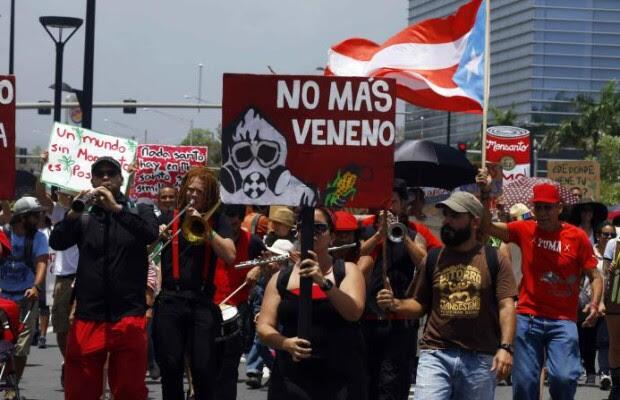sábado, octubre 31, 2015
Genetic engineering is not the same
Genetic Engineering is Very Different Than Traditional Breeding →
…there are multiple biologically relevant differences between the processes of traditional breeding and genetic engineering of crop plants; and the “process” of genetic engineering actually comprises multiple, different processes.
Therefore, genetic engineering is very different than traditional breeding. And, until proven otherwise, it should be assumed that the risks associated with these technologies must be different as well.
As a scientist trained in biology and genetics, I see no way other way to look at it.
Etiquetas: en
viernes, octubre 30, 2015
From GM Watch: New GM techniques give rise to GMOs, say reports
Products of gene editing and other new techniques must be labelled as GMOs
The products of gene editing and other new GM techniques are indeed GMOs under European law and must be regulated and labelled as such, two new reports conclude.
The first report, a legal analysis commissioned by the German Federal Agency for Nature Conservation (BfN), says genome editing techniques are indeed genetic engineering and give rise to GMOs.
The report says that these techniques, far from being precise and predictable as GMO proponents claim, “bear significant risk potentials”. The report adds that their effects are “foreseeable only to some degree due to the novelty of the procedures and the lack of relevant studies”.
The second report is by Friends of the Earth France, the French National Federation of Organic Agriculture, Confédération Paysanne, the Peasant Seeds Network, and members of the High Council of Biotechnology in France.
The new techniques covered are:
* Oligodirected mutagenesis
* Cisgenesis/Intragenesis
* Site directed Nucleases (SDN): zinc finger nucleases (also Talen/CrisprCas9/meganucleases)
* RNA dependent DNA methylation
* Grafting
* Reverse breeding
* Agro-infiltration
* Synthetic biology.
The report concludes that all the listed techniques give rise to GMOs which fall under the scope of the EU’s GMO regulations. That also means they should be labelled as GM.
Report in English: http://www.semencespaysannes.org/legal_status_of_products_derived_from_new_tec_12-actu_281.php
Report in French: http://www.semencespaysannes.org/statut_juridique_produits_issus_nouvelles_tec_12-actu_280.php
The first report, a legal analysis commissioned by the German Federal Agency for Nature Conservation (BfN), says genome editing techniques are indeed genetic engineering and give rise to GMOs.
The report says that these techniques, far from being precise and predictable as GMO proponents claim, “bear significant risk potentials”. The report adds that their effects are “foreseeable only to some degree due to the novelty of the procedures and the lack of relevant studies”.
The second report is by Friends of the Earth France, the French National Federation of Organic Agriculture, Confédération Paysanne, the Peasant Seeds Network, and members of the High Council of Biotechnology in France.
The new techniques covered are:
* Oligodirected mutagenesis
* Cisgenesis/Intragenesis
* Site directed Nucleases (SDN): zinc finger nucleases (also Talen/CrisprCas9/meganucleases)
* RNA dependent DNA methylation
* Grafting
* Reverse breeding
* Agro-infiltration
* Synthetic biology.
The report concludes that all the listed techniques give rise to GMOs which fall under the scope of the EU’s GMO regulations. That also means they should be labelled as GM.
Report in English: http://www.semencespaysannes.org/legal_status_of_products_derived_from_new_tec_12-actu_281.php
Report in French: http://www.semencespaysannes.org/statut_juridique_produits_issus_nouvelles_tec_12-actu_280.php
Seralini wins whistleblower award
Roundup researcher honoured by Federation of German Scientists (VDW) and the International Association of Lawyers Against Nuclear Arms
Prof Gilles-Eric Séralini will tomorrow be honoured with the 2015 Whistleblower Award by the Federation of German Scientists (VDW) and the German Section of the International Association of Lawyers Against Nuclear Arms (“IALANA”).
Prof Séralini will receive the award in recognition of his research demonstrating the toxic effects of Roundup herbicide on rats when administered at a low environmentally relevant dose over a long-term period. After the research was published, Prof Séralini was attacked in what the VDW and IALANA call “a vehement campaign by ‘interested circles’ from the chemical industry” as well as from the UK Science Media Centre. This smear campaign led to the retraction of his team’s paper by the first journal that published it. But Prof Séralini and his team fought back, countering the scientific arguments raised against their research and republishing their paper in another journal.
While Prof Séralini’s study was not a carcinogenicity study but a long-term toxicity study, the carcinogenic potential of Roundup was confirmed this year when the World Health Organisation’s cancer agency IARC published its verdict that glyphosate herbicides are “probable” human carcinogens.
VDW and IALANA said that Prof Séralini’s unwavering refusal to abandon his professional ethics since the publication of his paper “gained him the worldwide support of many scientists who defended the methods he chose and deemed his research results to represent genuine scientific progress”. They added, “He greatly furthered the scientific debate on the health risks of the glyphosate-based herbicide Roundup. He revealed systemic weaknesses in the accreditation process for herbicides in particular and pesticides in general. So once again it can clearly be seen that the preservation of our health depends on whistleblowers.”
Prof Séralini will share the Whistleblower Award jointly with the former US drone pilot Brandon Bryant. Bryant quit active service with the US armed forces in 2011 due to his rejection of the secret worldwide drone war carried out by the US. He particularly objected to the innumerable civilian victims and the severe psychological consequences for the drone pilots involved in the killings.
The awards will be presented on Friday, 16 October 2015, at 7.30pm, in the Bürgersaal of Karlsruhe City Hall in the presence of the Mayor, Dr Frank Mentrup.
More information:
http://neu.vdw-ev.de/wp-
Read this article online here: http://www.gmwatch.org/news/
Prof Séralini will receive the award in recognition of his research demonstrating the toxic effects of Roundup herbicide on rats when administered at a low environmentally relevant dose over a long-term period. After the research was published, Prof Séralini was attacked in what the VDW and IALANA call “a vehement campaign by ‘interested circles’ from the chemical industry” as well as from the UK Science Media Centre. This smear campaign led to the retraction of his team’s paper by the first journal that published it. But Prof Séralini and his team fought back, countering the scientific arguments raised against their research and republishing their paper in another journal.
While Prof Séralini’s study was not a carcinogenicity study but a long-term toxicity study, the carcinogenic potential of Roundup was confirmed this year when the World Health Organisation’s cancer agency IARC published its verdict that glyphosate herbicides are “probable” human carcinogens.
VDW and IALANA said that Prof Séralini’s unwavering refusal to abandon his professional ethics since the publication of his paper “gained him the worldwide support of many scientists who defended the methods he chose and deemed his research results to represent genuine scientific progress”. They added, “He greatly furthered the scientific debate on the health risks of the glyphosate-based herbicide Roundup. He revealed systemic weaknesses in the accreditation process for herbicides in particular and pesticides in general. So once again it can clearly be seen that the preservation of our health depends on whistleblowers.”
Prof Séralini will share the Whistleblower Award jointly with the former US drone pilot Brandon Bryant. Bryant quit active service with the US armed forces in 2011 due to his rejection of the secret worldwide drone war carried out by the US. He particularly objected to the innumerable civilian victims and the severe psychological consequences for the drone pilots involved in the killings.
The awards will be presented on Friday, 16 October 2015, at 7.30pm, in the Bürgersaal of Karlsruhe City Hall in the presence of the Mayor, Dr Frank Mentrup.
More information:
http://neu.vdw-ev.de/wp-
Read this article online here: http://www.gmwatch.org/news/
miércoles, octubre 28, 2015
Buckraking on the Food Beat: When Is It a Conflict of Interest?, by Stacky Malkan
Tamar Haspel writes a food column for the Washington Post–but her other sources of income are raising questions.
Commentary from a US colleague:
Another excellent story from US RTK on the Washington Post's Tamar Haspel taking money from biotech interests, but failing to reveal how much, all the while repeating industry talking points in her columns. Hassle maintains she'll only attend/arrange meetings if there are a range of views (not all pro-industry) on GE represented. However, the fact that she was a "faculty member" at a Biotechnology Literacy Project Conference, that was organized by Jon Entine and Cami Ryan (who now works for Monsanto) and funded by Genetic Literacy Project and Academic Reviews (both ag chem front groups) and Univ. of Florida, which has received tens of millions of dollars from biotech and big food companies.
Etiquetas: en, Tamar Haspel, Washington Post
Crisis del concepto de gen y alimentos transgénicos
http://www.jornada.unam.mx/2015/10/16/opinion/020a1pol
Por Julio Muñoz Rubio
Quienes defienden la producción y comercialización de los alimentos transgénicos lo hacen incluyendo solamente la parte de los conocimientos de biología molecular que les conviene, omitiendo mencionar el cúmulo de conocimientos que han metido en crisis a la teoría tradicional del gen.
Etiquetas: es, Julio Muñoz Rubio, La Jornada
miércoles, octubre 21, 2015
Doug Gurian-Sherman's part two of a two part series on the influence of money in agricultural research.
Money Talks, Muffling Dissenters →
In conjunction with the huge amounts of biotech industry money pouring into public universities has come the intimidation of scientists who criticize or question the development of biotechnology. A result has been the relative silence of academic scientists who have concerns about biotechnology or its development. The result of biotech industry money therefore seems to be not only an amplification of industry-friendly academic voices, with their ability to lend credibility to biotech, but also the likely reduction of academic scientist perspectives that could counter industry arguments.
Some of this has been well documented in articles such as those in the journalsNatureand Nature Biotechnology several years ago. One young scientist who was subject to such an attack by biotech industry supporters was quoted as saying, “The response we got—it went through the jugular.” In her case, this amounted to unfounded letters to the publisher of her research paper, and to the funder (the National Science Foundation) of her research, accusing her of verging on scientific misconduct.
Etiquetas: Doug Gurian-Sherman, en
lunes, octubre 19, 2015
Surprise - Cornell is taking the GMO safety debate to a new level!
http://www.theecologist.org/essays/2985883/surprise_cornell_is_taking_the_gmo_safety_debate_to_a_new_level.html

Something important just happened at Cornell's Alliance for Science, writes Steven M. Druker. Long known as a keen promoter of genetic engineering, the organization has experienced a profound change of direction. Its new director, Sarah Davidson Evanega, has opened an inclusive scientific dialogue on the safety of GMO crops. Who says it's all 'over'?

Pro-GMO philanthropist Bill Gates has been a big funder of Cornell University, Ithaca, NY - he even paid for its magnificent Gates Hall. But is Cornell's Alliance for Science performing a flip on GMO safety? Photo: Anne Ruthmann Photography via Flickr (CC BY-NC-ND).
Etiquetas: Alliance for Science, Cornell, Druker, en
Brasil ataca la moratoria internacional sobre semillas Terminator
http://etcgroup.org/es/content/brazil-aims-torpedo-international-moratorium-terminator-seeds

Los Derechos de los Agricultores y la Soberanía Alimentaria bajo fuego
Submitted on 02 Octubre 2015

En un momento en el que únicamente tres corporaciones — Monsanto, DuPont y Syngenta — controlan el 55% de las semillas comerciales del mundo, quienes representan los intereses del agronegocio introdujeron una iniciativa de ley en el Congreso de Brasil que busca revertir la prohibición de 10 años sobre la tecnología Terminator — semillas modificadas genéticamente para que su próxima generación sea estéril. La tecnología está diseñada para asegurar las ganancias de las corporaciones al eliminar el derecho ancestral de los agricultores de plantar las semillas de su cosecha.
Si se aprueba, la iniciativa de ley ahora en el Congreso — PL 1117/2015 — violaría una moratoria internacional sobre las pruebas en el campo y la comercialización de semillas Terminator, adoptada unánimemente en el año 2000, y ratificada en 2006 Curitiba, Brasil, por 192 gobiernos pertenecientes al Convenio sobre Diversidad Biológica.[1]
Etiquetas: es, Grupo ETC, Terminator
sábado, octubre 17, 2015
Dirty money, dirty science
by Doug Gurian-Sherman
Food Tank, 22 September 2015
http://foodtank.com/news/2015/
The biotech industry’s web of attempts to buy credibility, by laundering its messages through supposedly independent academic scientists, is unraveling and beginning to reveal the influence of huge amount of industry money on the independence of academic agricultural science. Some of this process was revealed recently in The New York Times. Many of these efforts to influence policy or public opinion start with industry staff emails, including suggested topics, points, and themes, which are then laundered through the credibility of academic scientists. It is a matter of academic scientists promoting positions and arguments of the industry, not merely a sharing of positions that each party already held and were acting on.
Food Tank, 22 September 2015
http://foodtank.com/news/2015/
The biotech industry’s web of attempts to buy credibility, by laundering its messages through supposedly independent academic scientists, is unraveling and beginning to reveal the influence of huge amount of industry money on the independence of academic agricultural science. Some of this process was revealed recently in The New York Times. Many of these efforts to influence policy or public opinion start with industry staff emails, including suggested topics, points, and themes, which are then laundered through the credibility of academic scientists. It is a matter of academic scientists promoting positions and arguments of the industry, not merely a sharing of positions that each party already held and were acting on.
Etiquetas: Doug Gurian-Sherman, en
martes, octubre 13, 2015
lunes, octubre 12, 2015
México: Nosotros somos los "antagónicos"
La Jornada: Trasnacionales en alianza promueven campaña contra grupos antagónicos →
Angélica Enciso
Periódico La Jornada
Lunes 5 de octubre de 2015, p. 36
Lunes 5 de octubre de 2015, p. 36
Con el fin de contrarrestar la intensa campaña de grupos antagónicos al cultivo de transgénicos, en particular del maíz, la asociación AgroBio –que agrupa a las cinco grandes empresas que producen estas semillas en el mundo– promovió la Alianza Pro Transgénicos, apoyada por apenas 19 investigadores y agricultores industriales.
Esos grupos antagónicos mantienen un estatus absurdo y amenazante, con respecto a riesgo o daños inexistentes y prejuicios por aplicaciones de la biotecnología, señaló Jaime Padilla, director científico de esa asociación, en un documento en que convocó a organizaciones y expertos a participar en esa alianza.
Etiquetas: es, La Jornada, Mexico
sábado, octubre 10, 2015
Big Industry’s All Out Assault on Democracy and Your Right to Know
Big Industry’s All Out Assault on Democracy and Your Right to Know →
How an agrichemical industry mouthpiece is trying to undermine GMO labeling with bogus legal analysis
In an op-ed published by Forbes last week, a pro-biotechnology mouthpiece who used to work for the tobacco industry wrote a provocative piece arguing that a recent U.S. Supreme Court decision imperiled the constitutionality of mandatory genetically engineered food labeling. The claim is flat out wrong and shows no understanding of constitutional law or the issue of labeling of genetically engineered foods. Before rebutting it, some context is helpful.
Etiquetas: en, George Kimbrell
viernes, octubre 09, 2015
Mitos y verdades sobre los alimentos modificados genéticamente
http://www.80grados.net/mitos-y-verdades-sobre-los-alimentos-modificados-geneticamente-gmo/
El 23 de julio del presente año, la Cámara de Representantes de Estados Unidos aprobó la ley HR 1599 curiosamente nombrada: “The Safe and Accurate Food Labeling Act”. Esta ley, conocida entre el público como la ley DARK, “Deny Americans the Right to Know”, aunque habla de seguridad y etiquetado en su nombre, irónicamente lo que busca precisamente es prohibir en los estados toda iniciativa a favor de la rotulación de los productos que sean producidos o que contengan alimentos modificados genéticamente, conocidos también por sus siglas en inglés como “GMO”. De acuerdo a Enviromental Working Group (EWG), las compañías de alimentos y biotecnología gastaron $63.6 millones en el 2014 para presionar y lograr la aprobación de este tipo de legislación anti etiquetado, tres veces más que el año anterior. En el 2013 invirtieron alrededor de $25.4 millones, y de esos, $13.3 millones fueron aportados por las empresas Coca Cola y Pepsi Co. De aprobarse esta ley, Puerto Rico también se vería afectado. Proyectos legislativos como el 524 de la senadora María De Lourdes Santiago, que busca el etiquetado de los productos con ingredientes transgénicos, y el del representante Ricardo Llerandi Cruz, serían igualmente detenidos.
El 23 de julio del presente año, la Cámara de Representantes de Estados Unidos aprobó la ley HR 1599 curiosamente nombrada: “The Safe and Accurate Food Labeling Act”. Esta ley, conocida entre el público como la ley DARK, “Deny Americans the Right to Know”, aunque habla de seguridad y etiquetado en su nombre, irónicamente lo que busca precisamente es prohibir en los estados toda iniciativa a favor de la rotulación de los productos que sean producidos o que contengan alimentos modificados genéticamente, conocidos también por sus siglas en inglés como “GMO”. De acuerdo a Enviromental Working Group (EWG), las compañías de alimentos y biotecnología gastaron $63.6 millones en el 2014 para presionar y lograr la aprobación de este tipo de legislación anti etiquetado, tres veces más que el año anterior. En el 2013 invirtieron alrededor de $25.4 millones, y de esos, $13.3 millones fueron aportados por las empresas Coca Cola y Pepsi Co. De aprobarse esta ley, Puerto Rico también se vería afectado. Proyectos legislativos como el 524 de la senadora María De Lourdes Santiago, que busca el etiquetado de los productos con ingredientes transgénicos, y el del representante Ricardo Llerandi Cruz, serían igualmente detenidos.
Etiquetas: es, Puerto Rico, Vilma Calderon
lunes, octubre 05, 2015
From GM Watch: How “the Biofortified boys” defended the pesticide industry’s secrets in Hawaii
http://gmwatch.org/news/latest-news/16432


Industry calls pro-GMO scientists “part of our overall public education strategy”
In 2013 in Kauai, Hawaii, Kauai County Councilman Gary Hooser proposed a bill to protect people from pesticide spraying on GMO crops. Bill 2491 would have enforced buffer zones between sprayed and public areas and required disclosure of the pesticides being sprayed.
Reasonable demands, you might think – but the pesticide industry disagreed. It launched a massive PR and lobbying exercise to defeat the bill, as revealed by a recent New York Times’ investigation. The industry’s chosen mouthpieces for the Hawaii project were the pro-GMO scientist Kevin Folta and a group of other supposedly independent scientists, who travelled to Kauai to testify against the bill in Kauai County Council hearings.
Reasonable demands, you might think – but the pesticide industry disagreed. It launched a massive PR and lobbying exercise to defeat the bill, as revealed by a recent New York Times’ investigation. The industry’s chosen mouthpieces for the Hawaii project were the pro-GMO scientist Kevin Folta and a group of other supposedly independent scientists, who travelled to Kauai to testify against the bill in Kauai County Council hearings.
Etiquetas: Biofortified, en, GM Watch, Hawaii, Kevin Folta
sábado, octubre 03, 2015
Biotech industry faces bleak outlook in Europe
Half of Europe opts out of new GM crop scheme →
Half of the European Union’s 28 countries and three of its regions have opted out of a new GM crop scheme, in a blow to biotech industry hopes.Under new EU rules agreed in March, 15 countries have now told Brussels they will send territorial exclusion requests to the big agricultural multinationals including Monsanto, Dow, Syngenta and Pioneer.
viernes, octubre 02, 2015
Calestous Juma BUSTED
Harvard professor failed to disclose Monsanto connection in paper touting GMOs - The Boston Globe→
A Harvard Kennedy School professor wrote a widely disseminated policy paper last year in support of genetically modified organisms at the behest of seed giant Monsanto, without disclosing his connection, e-mails show.
Monsanto not only suggested the topic to professor Calestous Juma. It went so far as to provide a summary of what the paper should say and a suggested headline. The company then connected the professor with a marketing company to pump it out over the Internet as part of Monsanto’s strategy to win over the public and lawmakers, according to e-mails obtained through a public records request.
Etiquetas: Calestous Juma, en, Harvard




